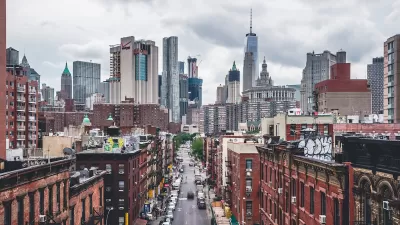Kaid Benfield investigates the rise of a more independent and nimble workforce, and ponders what the new economy means for the shape of cities as we enter an urban epoch
Benfield quotes Thomas Fisher, dean of the College of Design at the University of Minnesota, on the changes to the physical environment that a liberated workforce will demand.
According to Fisher, "The next economy, though, may look more like the way in which people lived and worked prior to the industrial revolution, in which home, office, and shop co-exist in some combination of physical and digital space. This may require rethinking our zoning laws to allow for a much finer-grain mix of uses and repurposing buildings designed for single functions that will have no tenants or buyers if they remain that way."
Benfield argues that, while cities may no longer be necessary to maximize manufacturing efficiencies, they will be essential in providing the amenities to attract and encourage the creativity (paraphrasing Richard Florida) required for the new economy.
FULL STORY: What does the new economy mean for the shape of communities?

Manufactured Crisis: Losing the Nation’s Largest Source of Unsubsidized Affordable Housing
Manufactured housing communities have long been an affordable housing option for millions of people living in the U.S., but that affordability is disappearing rapidly. How did we get here?

Americans May Be Stuck — But Why?
Americans are moving a lot less than they once did, and that is a problem. While Yoni Applebaum, in his highly-publicized article Stuck, gets the reasons badly wrong, it's still important to ask: why are we moving so much less than before?

Research Shows More Roads = More Driving
A national study shows, once again, that increasing road supply induces additional vehicle travel, particularly over the long run.

Judge Halts Enforcement of Anti-Homeless Laws in Grants Pass
The Oregon city will be barred from enforcing two ordinances that prosecute unhoused residents until it increases capacity and accessibility at designated camping sites.

Advancing Sustainability in Los Angeles County Schools
The Los Angeles County Office of Education’s Green Schools Symposium brings together educators, students, and experts to advance sustainability in schools through innovative design, climate resilience strategies, and collaborative learning.

Using Old Oil and Gas Wells for Green Energy Storage
Penn State researchers have found that repurposing abandoned oil and gas wells for geothermal-assisted compressed-air energy storage can boost efficiency, reduce environmental risks, and support clean energy and job transitions.
Urban Design for Planners 1: Software Tools
This six-course series explores essential urban design concepts using open source software and equips planners with the tools they need to participate fully in the urban design process.
Planning for Universal Design
Learn the tools for implementing Universal Design in planning regulations.
City of Moreno Valley
Institute for Housing and Urban Development Studies (IHS)
City of Grandview
Harvard GSD Executive Education
NYU Wagner Graduate School of Public Service
City of Cambridge, Maryland
Newport County Development Council: Connect Greater Newport





























